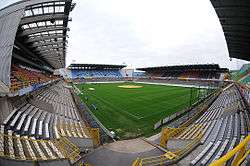Club Brugge KV
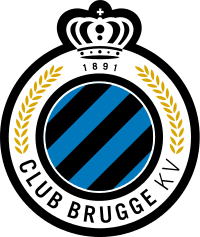 | ||||
| Full name | Club Brugge Koninklijke Voetbalvereniging (Club Bruges Royal Football association) | |||
|---|---|---|---|---|
| Nickname(s) | Blauw-Zwart (Blue-Black), Club, FCB | |||
| Founded |
13 November 1891 Stamnummer (matricule number) 3 | |||
| Ground | Jan Breydel Stadium | |||
| Capacity | 29.042[1] | |||
| President |
| |||
| Head coach |
| |||
| League | Belgian Pro League | |||
| 2015–16 | Belgian Pro League, 1st | |||
| Website | Club home page | |||
|
| ||||
Club Brugge Koninklijke Voetbalvereniging (Dutch pronunciation: [klɵˈbrɵɣə ˈkoːnɪŋkləkə ˈvudbɑlvəˈreːnəɣɪŋ]),[2] also referred to as just Club Brugge, is a football club based in Bruges in Belgium. It was founded in 1891 and its home ground is the Jan Breydel Stadium, which has a capacity of 29,472.
One of the most decorated clubs in Belgian football, it has been Belgian league champion on 14 occasions, second only to major rivals Anderlecht, and it shares the Jan Breydel Stadium with city rival Cercle Brugge, with whom they contest the Bruges derby.
Throughout its long history, Club Brugge has enjoyed much European football success, reaching two European finals and two European semi-finals. Club Brugge is the only Belgian club to have played the final of the European Cup (forerunner of the current UEFA Champions League) so far, losing to Liverpool in the final of the 1978 season. They also lost in the 1976 UEFA Cup Final to the same opponents. Club Brugge holds the European record number of consecutive participations in the UEFA Europa League (20), the record number of Belgian cups (11) and the record number of Belgian Supercups (14).
History
| ||||||||||||||||||||||||||||||||||||||||||||||||||||||||||||||||||||||||||||||||||||||||||||||||||||||||||||||||||||||||||||||||||||
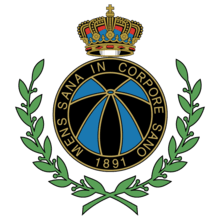
- 1890: Brugsche Football Club
Club created by old students of the Catholic school Broeders Xaverianen and the neutral school Koninklijk Atheneum.
- 13 November 1891: Club recreated
The club was recreated. This has since been adopted as the official date of foundation.
- 1892: First board
An official board was installed in the club.
- 1894: Football Club Brugeois
Club created by 16 old members of Brugsche FC.
- 1895: Vlaamsche Football Club de Bruges
Club created in the city.
- 1895–96: the UBSSA set up in 1895. and they went to the UBSSA and took part of the first Belgian national league.
- 1896: Leaving the UBSSA
Financially it was difficult for FC Brugeois and so after only one year they had to leave the UBSSA.
- 1897: Fusion
FC Brugeois joined Brugsche FC but they continued under the name Football Club Brugeois.
- 1902: New fusion
Vlaamsche FC joined FC Brugeois.
- 1912: De Klokke
They moved to a new stadium named "De Klokke".
- 1913–14: First cup final
FC Brugeois reached their first Belgian Cup final but they lost 2–1 from Union SG.
- 1920: First time league champions
The club became for the first time champions of the first division.
- 1926: Royal Football Club Brugeois
The club get number 3 as their matricule number and in the same year they get the royal title.
- 1928: First relegation
A first low when the club was relegated to the second division.
- 1930: New statute
President Albert Dyserynck changed the club's statute into a non-profit association.
- 1931: Albert Dyserynckstadion
When president Albert Dyserynck suddenly died they honoured him by changing the stadium's name into Albert Dyserynckstadion.
- 1959: Permanent to the first division
RFC Brugeois promoted to the first division and never relegated again in the future.
- 1968: First time cup winners
They won the Belgian Cup for the first time against Beerschot AC (1–1, 7–6 after penalty's).
- 1972: Club Brugge Koninklijke Voetbalvereniging
The club changed their name into the Flemisch name Club Brugge KV
- 1975: Olympiastadion
They moved from Albert Dyserynckstadion to Olympiastadion (current Jan Breydelstadion).
- 1976: Highest position in UEFA Cup
Under Austrian coach Ernst Happel, Club Brugge reached the finals of the UEFA Cup and lost against Liverpool (3–2 and 1–1).
- 1978: Only Belgian European Cup 1 finalists
Still under Ernst Happel, the club faced Liverpool again of a European final. This time it was in the European Champions Clubs' Cup final. And again they lost (1–0). Club Brugge is the only Belgian club that has reached the finals of the European biggest competition.
- 1992: First goal scorer in the Champions League
Daniel Amokachi is the first goal scorer in the Champions League. He scored against CSKA Moscow.
- 1998: Jan Breydelstadion
Olympiastadion had to be expanded for the EURO 2000 organisation. They also changed the name into Jan Breydelstadion.
- 2006: CLUBtv
Club Brugge was the first Belgian club to create its own TV channel.
Crest and colours
The club don a black and blue home kit traditional to their history, away they wear a red strip.
Stadium
Supporters
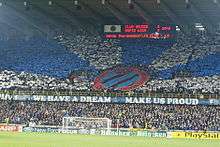
Club Brugge is the most supported club in Belgium. it has fans all over the country. Attendances are high. The Jan Breydel Stadium is almost sold out at every home game. Some of these fans are part of 62 supporter clubs in Belgium, which have more than 10,000 members. The "Supportersfederatie Club Brugge KV", founded in 1967, is recognized as the official supporters club of Club Brugge.
Club Brugge's most vocal fans are known to gather in the 'Noord-tribune', the 'Kop', of the Jan Breydel Stadium. Club Brugge fans are known for their lively atmosphere, taking their inspiration from the British football culture. As such, the supporters of Club Brugge were labelled as 'the best supporters of Belgium' by a survey in 2015. The Blue Army is the club's main active supporter group. This group is responsible for the organization of tifos and the publishing of a fanzine. The North Fanatics are the club's second, smaller supporter group. They try to achieve a non-stop atmosphere in the stadium, by using smoke bombs, flags, flares, constant singing, etc.
In tribute the fans, often dubbed the twelfth man in football, Club Brugge no longer assigns the number 12 to players. Club Brugge also has a TV show, CLUBtv, on the Telenet network since 21 July 2006. This twice weekly show features exclusive interviews with players, coaches and managers.
Mascot
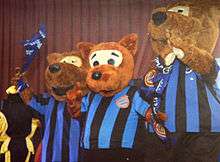
The official mascot of Club Bruges is a bear, symbol of the city of Bruges. The history of the bear is related to a legend of the first Count of Flanders, Baldwin I of Flanders, who had fought and defeated a bear in his youth. Since the end of 2000, a second mascot, always a bear, travels along the edge of the field during home games for fans to call and encourage both their favorites. These two bears are called Belle and Bene. In 2010, a third bear named Bibi, made its appearance. He is described as the child of the first two mascots, and is oriented towards the young supporters.
Rivalries
Like many historic clubs, Club Brugge contests rivalries with other Belgian clubs, whether at local (Cercle Brugge), regional level (Gent and Anderlecht).
Gent
At regional level, Club Brugge has maintained rivalry with Gent, a team in the neighboring province. The successes achieved by Club Bruges in the early 1970s, combined with very poor season performances by Gent in the same period, attracted many fans. Since the late 1990s, Gent again played a somewhat more leading role in Belgium, and matches against Club Brugge were often spectacles.
Anderlecht
The rivalry between Club Brugge and Anderlecht has developed since the 1970s. At that time, the Brussels-based club and Club Brugge won most trophies between them, leaving little room for other Belgian teams. Matches between these two teams were often contested for the title of champion of Belgium. Three Belgian Cup finals were played between the two clubs (with Anderlecht winning once and Club Brugge twice), and they played seven Belgian Supercups (Club Bruges won five). A match between these two sides is often called 'The Hate Game'. They are arguably the most heated fixtures in Belgian football.
Honours
Domestic
- Winners (14): 1919–20, 1972–73, 1975–76, 1976–77, 1977–78, 1979–80, 1987–88, 1989–90, 1991–92, 1995–96, 1997–98, 2002–03, 2004–05, 2015–16
- Runners-up (21): 1898–99, 1899-00, 1905–06, 1909–10, 1910–11, 1966–67, 1967–68, 1969–70, 1970–71, 1971–72, 1984–85, 1985–86, 1993–94, 1996–97, 1998–99, 1999-00, 2000–01, 2001–02, 2003–04, 2011–12, 2014–15
- Winners (11): 1967–68, 1969–70, 1976–77, 1985–86, 1990–91, 1994–95, 1995–96, 2001–02, 2003–04, 2006–07, 2014–15
- Runners-up (7): 1913–14, 1978–79, 1982–83, 1993–94, 1997–98, 2004–05, 2015–16
- Winners (14): 1980, 1986, 1988, 1990, 1991, 1992, 1994, 1996, 1998, 2002, 2003, 2004, 2005, 2016
- Runners-up (3): 1995, 2007, 2015
International
- European Champion Clubs' Cup Final: 1
- European Champion Clubs' Cup Quarter-final: 1
- UEFA Cup Final: 1
- UEFA Cup Semi-final: 1
- UEFA Cup / UEFA Europa League Quarter-final: 1
- UEFA Cup Winners' Cup Semi-final: 1
- UEFA Cup Winners' Cup Quarter-final: 2
- Kirin Cup Winners: 1
- 1981
Pre-Season Friendly
- Amsterdam Tournament Winners: 1
- 1990
Players
First-team squad
- As of 3 December 2016 – Notes: - 2 players are injured at the moment
Note: Flags indicate national team as defined under FIFA eligibility rules. Players may hold more than one non-FIFA nationality.
|
|
For recent transfers, see the list of Belgian football transfers summer 2016.
Registered reserve-team players
|
|
Out on loan
|
|
Retired numbers
12 – The 12th man (reserved for the club supporters)
23 – ![]() François Sterchele, striker (2007–08). Posthumous; Sterchele died in a single-person car accident on 8 May 2008.
François Sterchele, striker (2007–08). Posthumous; Sterchele died in a single-person car accident on 8 May 2008.
Reserve-team (U21) and Club Academy (U19) squad
- As of 10 September 2016 – Note: Reserve players are given a "B" squad number.
Note: Flags indicate national team as defined under FIFA eligibility rules. Players may hold more than one non-FIFA nationality.
|
|
Former players
Club captains
Club Officials
Board of Directors
-
.svg.png) Bart Verhaeghe (President)
Bart Verhaeghe (President) -
.svg.png) Jan Boone (Board Member)
Jan Boone (Board Member) -
.svg.png) Bart Coeman (Board Member)
Bart Coeman (Board Member) -
.svg.png) Sam Sabbe (Board Member)
Sam Sabbe (Board Member) -
.svg.png) Peter Vanhecke (Board Member)
Peter Vanhecke (Board Member) -
.svg.png) Vincent Mannaert (CEO)
Vincent Mannaert (CEO)
Management
-
.svg.png) Vincent Mannaert (CEO)
Vincent Mannaert (CEO) -
.svg.png) Veroniek Degrande (Finance Manager)
Veroniek Degrande (Finance Manager) -
.svg.png) Jorgen Van hellemont (CCO)
Jorgen Van hellemont (CCO) -
.svg.png) Evy Verhaeghe (Legal Manager)
Evy Verhaeghe (Legal Manager) -
.svg.png) Dagmar Decramer (Operations Manager)
Dagmar Decramer (Operations Manager) -
.svg.png) Roel Vaeyens (Coordinator Sport)
Roel Vaeyens (Coordinator Sport)
First-team staff
Coaching staff
.svg.png) Michel Preud'homme (Head Coach T1)
Michel Preud'homme (Head Coach T1).svg.png) Philippe Clement (Assistant Coach T2)
Philippe Clement (Assistant Coach T2).svg.png) Stephan Van der Heyden (Assistant Coach T3)
Stephan Van der Heyden (Assistant Coach T3).svg.png) Stan Van den Buijs (Assistant Coach T4/Tactical Scout)
Stan Van den Buijs (Assistant Coach T4/Tactical Scout).svg.png) Jan Van Steenberghe (Goalkeeping Coach)
Jan Van Steenberghe (Goalkeeping Coach).svg.png) Renaat Philippaerts (Physical Coach)
Renaat Philippaerts (Physical Coach).svg.png) Mario Ballegeer (Video Analyst)
Mario Ballegeer (Video Analyst).svg.png) Dieter Deprez (Sport Scientist)
Dieter Deprez (Sport Scientist)
Medical staff
.svg.png) Thierry Dalewyn (Doctor)
Thierry Dalewyn (Doctor).svg.png) Lode Dalewyn (Doctor)
Lode Dalewyn (Doctor).svg.png) Jan Van Damme (Physiotherapist)
Jan Van Damme (Physiotherapist).svg.png) Dimitri Dobbenie (Physiotherapist)
Dimitri Dobbenie (Physiotherapist).svg.png) Valentijn Deneulin (Physiotherapist)
Valentijn Deneulin (Physiotherapist).svg.png) Peter Destickere (Masseur)
Peter Destickere (Masseur)
Team Support
.svg.png) Dévy Rigaux (Team Manager)
Dévy Rigaux (Team Manager).svg.png) Pascal Plovie (Kit Man)
Pascal Plovie (Kit Man).svg.png) Michel Dierings (Assistant Kit Man)
Michel Dierings (Assistant Kit Man).svg.png) Herman Brughmans (Assistant Kit Man)
Herman Brughmans (Assistant Kit Man).svg.png) Martine Calleuw (Housekeeper)
Martine Calleuw (Housekeeper).svg.png) Melanie Depuydt (Sport Support)
Melanie Depuydt (Sport Support).svg.png) Lode Lobbestael (Team Delegate)
Lode Lobbestael (Team Delegate)
Youth staff
.svg.png) Pascal De Maesschalck (Head of Youth Development)
Pascal De Maesschalck (Head of Youth Development).svg.png) Sven Vermant (Coach U21)
Sven Vermant (Coach U21).svg.png) Rik De Mil (Coach U19)
Rik De Mil (Coach U19).svg.png) Dirk Laleman (Physical Coach)
Dirk Laleman (Physical Coach).svg.png) Sander Krabbendam (Goalkeeping Coach)
Sander Krabbendam (Goalkeeping Coach).svg.png) Willy Loose (Assistant Goalkeeping Coach)
Willy Loose (Assistant Goalkeeping Coach).svg.png) Dimitri Vastenavondt (Physiotherapist)
Dimitri Vastenavondt (Physiotherapist).svg.png) Stijn Claeys (Sport Coordinator)
Stijn Claeys (Sport Coordinator)
See also
References
- ↑ http://clubbrugge.be/fr/le-club/stade
- ↑ Club in isolation: [klɵp].
External links
| Wikimedia Commons has media related to Club Brugge. |
- Official website (Dutch) / (French) / (English) / (Spanish)
- Official Facebook Fanpage
- Official Twitter account
- Official Fan Federation (Dutch)
- Blue Army – Fan Association & Fan-zine (Dutch)
- Club Brügge KV XtraTime Fanpage (English)
- Club Brügge at UEFA.COM (English)
- Club Brügge at EUFO.DE
- Club Brügge at Weltfussball.de
- Club Brügge at Football Squads.co.uk
- Club Brügge at National Football Teams.com
- Club Brügge at Football Lineups.com
